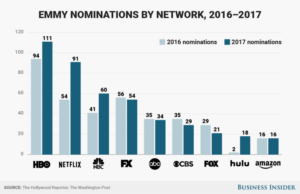The 70th Primetime Emmy Awards in downtown Los Angeles last night saw a few attention-catching and even historic moments. Black-ish star Jenifer Lewis donned a bedazzled Nike sweatshirt on the red carpet in support of NFL player Colin Kaepernick’s controversial Nike ad and subsequent backlash. Oscars producer Glenn Weiss proposed to his girlfriend live on stage during his acceptance speech, an Emmys first. (Also, unprecedented: Last night’s broadcast pulled in 10.2 million viewers, the lowest ever ratings for the awards show.)
Unsurprisingly, HBO took home the most awards at 23, including the prestigious award for best drama series, maintaining its years-long streak. However, the No. 1 spot was shared by rival Netflix. This year marks the first time Netflix has claimed the top spot for most Emmy wins. The streaming service took third place at the 2016 awards and rose to the No. 2 spot last year.
Netflix is a pioneer in the on-demand media industry. It is a digital warehouse of TV shows, movies, documentaries, and educational shows. Those who pay a modest monthly fee gain unlimited access to its haul with the freedom to consume the content on any platform, be it TV, computer, or mobile device. Netflix is TV’s first serious contender in its nearly-century-long existence.
The streaming service started humbly as a provider of DVD rentals via mail. With its initial business model, Netflix was much more a rival of brick-and-mortar stores. When it rolled out its on-demand capabilities, it immediately became superior to the likes of Blockbuster and Movie Gallery. It didn’t take long for its competitors to fall to the wayside.
Acting on its motto of user flexibility over corporate efficiency, Netflix launched its first original series, House of Cards, in 2013. Since the immense success of the show, Netflix has drastically increased the amount of original content it produces. By offering captivating, on-demand content, Netflix has forced cable companies to reconsider the way they do business.
While networks greenlight new shows based on metrics, Netflix has offered contracts to showrunners for an entire season or two upfront. It also started giving entire seasons to audiences at once. (Binge-watching, anyone?) Most TV networks can’t afford to give up the ad dollars earned from the one-time-weekly dissemination model.
Netflix has also given showrunners creative freedom without corporate restraints, which has led to some of the platform’s biggest hits like Orange Is the New Black. Netflix is making it much harder for network television to secure top-notch talent.
In perhaps its best move against traditional networks, Netflix got aggressive in collecting data from its users. First used to help suggest appealing content to users, Netflix shifted and began to use the information to define which kinds of content it should create. Using this model has led to sky high rates of success with new shows.
Sealing the deal, a Netflix subscription is much more affordable than cable service. Starting at just $7.99 per month, Netflix is just a fifth of the price of some cable packages. Furthermore, there are no ads. No one likes sitting through 15 minutes of ads per 45 minutes of content, and that’s exactly how TV makes the bulk of its revenue. Canceling cable is the top fear of TV networks. If unbundled, they would have only their own merits to contend with. Netflix’s continuing success puts constant pressure on television networks.
Sources:
https://qz.com/1295998/netflix-is-making-it-harder-for-tv-networks-to-make-tv/
https://www.telegraph.co.uk/on-demand/2016/11/21/how-netflix-changed-the-way-we-watch/

Leave a Reply
You must be logged in to post a comment.